-
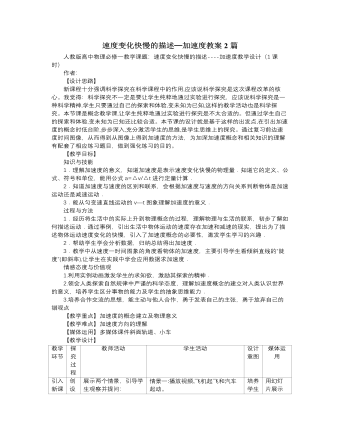
人教版新课标高中物理必修1速度变化快慢的描述─加速度教案2篇
【设计思路】新课程十分强调科学探究在科学课程中的作用,应该说科学探究是这次课程改革的核心。我觉得:科学探究不一定是要让学生纯粹地通过实验进行探究,应该说科学探究是一种科学精神,学生只要通过自己的探索和体验,变未知为已知,这样的教学活动也是科学探究。本节课是概念教学课,让学生纯粹地通过实验进行探究是不太合适的。但通过学生自己的探索和体验,变未知为已知还比较合适。本节课的设计就是基于这样的出发点,在引出加速度的概念时低台阶,步步深入,充分激活学生的思维,是学生思维上的探究。通过复习前边速度时间图像,从而得到从图像上得到加速度的方法,为加深加速度概念和相关知识的理解有配套了相应练习题目,做到强化练习的目的。【教学目标】知识与技能1.理解加速度的意义,知道加速度是表示速度变化快慢的物理量.知道它的定义、公式、符号和单位,能用公式a=△v/△t进行定量计算.2.知道加速度与速度的区别和联系,会根据加速度与速度的方向关系判断物体是加速运动还是减速运动.
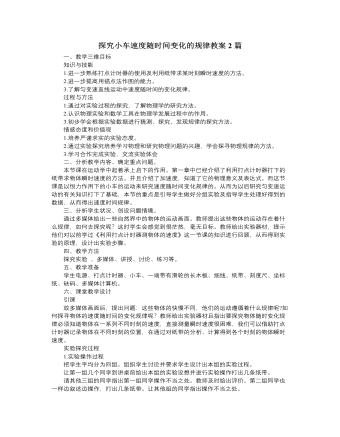
人教版新课标高中物理必修1探究小车速度随时间变化的规律教案2篇
3、若出现了个别明显偏离绝大部分点所在直线的点,该如何处理?(对于个别明显偏离绝大部分点所在直线的点,我们可以认为是测量误差过大、是测量中出现差错所致,将它视为无效点,但是在图像当中仍应该保留,因为我们要尊重实验事实,这毕竟是我们的第一手资料,是原始数据。)4、怎样根据所画的v-t图像求加速度?(从所画的图像中取两个点,找到它们的纵、横坐标(t1,v1)、(t2,v2),然后代入公式,求得加速度,也就是直线的斜率。在平面直角坐标系中,直线的斜率四、实践与拓展例1、在探究小车速度随时间变化规律的实验中,得到一条记录小车运动情况的纸带,如图所示。图中A、B、C、D、E为相邻的计数点,相邻计数点的时间间隔为T=0.1s。⑴根据纸带上的数据,计算B、C、D各点的数据,填入表中。
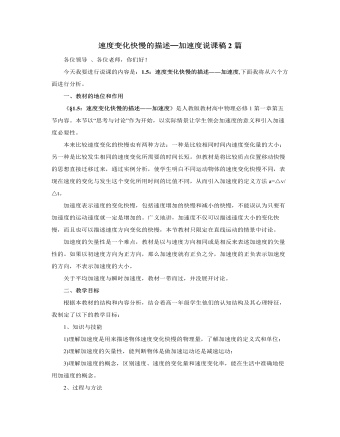
人教版新课标高中物理必修1速度变化快慢的描述─加速度说课稿2篇
本来比较速度变化的快慢也有两种方法:一种是比较相同时间内速度变化量的大小;另一种是比较发生相同的速度变化所需要的时间长短。但教材是将比较质点位置移动快慢的思想直接迁移过来,通过实例分析,使学生明白不同运动物体的速度变化快慢不同,表现在速度的变化与发生这个变化所用时间的比值不同,从而引入加速度的定义方法a=△v/△t。加速度表示速度的变化快慢,包括速度增加的快慢和减小的快慢,不能误认为只要有加速度的运动速度就一定是增加的。广义地讲,加速度不仅可以描述速度大小的变化快慢,而且也可以描述速度方向变化的快慢,本节教材只限定在直线运动的情景中讨论。加速度的矢量性是一个难点,教材是以与速度方向相同或是相反来表述加速度的矢量性的。如果以初速度方向为正方向,那么加速度就有正负之分,加速度的正负表示加速度的方向,不表示加速度的大小。
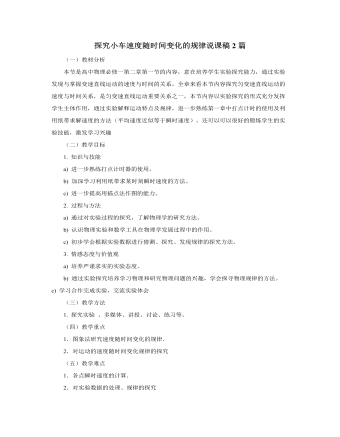
人教版新课标高中物理必修1探究小车速度随时间变化的规律说课稿2篇
(三)合作交流能力提升教师:刚才我们通过实验了解了小车的速度是怎样随时间变化的,但实验中有一定的误差,请同学们讨论并说出可能存在哪些误差,造成误差的原因是什么?(每个实验小组的同学之间进行热烈的讨论)学生:测量出现误差。因为点间距离太小,测量长度时容易产生误差。教师:如何减小这个误差呢?学生:如果测量较长的距离,误差应该小一些。教师:应该采取什么办法?学生:应该取几个点之间的距离作为一个测量长度。教师:好,这就是常用的取“计数点”的方法。我们应该在纸带上每隔几个计时点取作一个计数点,进行编号。分别标为:0、1、2、3……,测各计数点到“0”的距离。以减小测量误差。教师:还有补充吗?学生1:我在坐标系中描点画的图象只集中在坐标原定附近,两条图象没有明显的分开。学生2:描出的几个点不严格的分布在一条直线上,还能画直线吗?
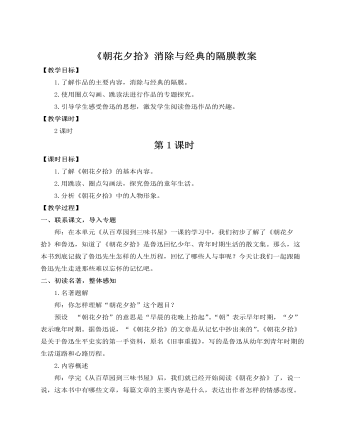
人教部编版七年级语文上册名著导读 《朝花夕拾》 消除与经典的隔膜教案
3.小组合作,交流阅读体会,填写阅读任务卡4.师点评并展示优秀的阅读任务卡【设计意图】本环节侧重寻找《朝花夕拾》中表现鲁迅先生儿童教育观念的地方,通过细节审视,深入体会鲁迅先生对于儿童教育观念的独特认识和深切关怀。在这轻松而有感染力的文字里,我们能真切地感受到鲁迅先生对儿童教育的切身感受。联系现实,让学生对鲁迅先生的儿童教育观的现实意义也有强烈的认同感,从而理解鲁迅先生,理解文本里的情感,拉近与文本的距离。三、汇报探究成果,评选优秀学生1.各小组内汇总专题探究阅读任务卡2.各小组内不记名投票,评选出最优秀的阅读任务卡3.师汇总各小组最优秀的阅读任务卡,在全班展示4.评选优秀汇报者针对最优秀的阅读任务卡和各小组汇报情况,全班填写“《朝花夕拾》阅读汇报评价表”,评选出三位阅读任务卡优秀制作者和一名优秀专题汇报者。课件出示:
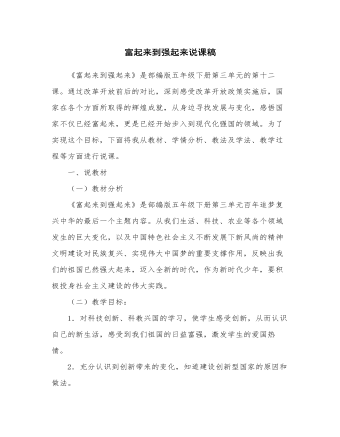
人教部编版道德与法制五年级下册新版富起来到强起来说课稿第二课时
1.看过了视频,接下来由各个小组与我们分享他们在课下准备的核心价值观小品,每组表演时,剩下的小组猜测表演的是哪一个核心价值观并在活动评价单上进行评分。2.教师总结:“精神文明建设使人们的生活更美好”教师引导学生:精神文明建设搞好了,人心凝聚,精神振奋,各项事业才会全面兴盛。活动二:走进新时代,怀揣中国梦。1.播放“中国梦”优秀少儿演讲视频。2.阅读课本,交流感想。活动三:争做时代好少年1.回顾各小组的表演,把其中所有的不良习惯和闪光举动逐个挑出来再次强调。2.小组交流班级内部常见的坏习惯。教师总结。总结延伸:通过本节课的学习了解到青少儿应积极投身于社会主义精神文明建设的伟大实践中去,做新时代的好少,做新时期中国先进文化的传播者。
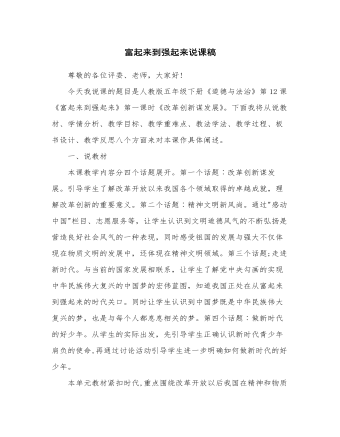
人教部编版道德与法制五年级下册新版富起来到强起来说课稿第一课时
阅读教材第88、89页内容,思考︰(1)"新四大发明"出现的主要原因是什么?(2)科技创新与国家发展、人民生活有什么关系?(3)改革创新对于一个国家和民族有什么重要作用?提示︰(1)改革创新的实践以及"科教兴国"战略的落实。(2)促进了经济领域的飞速发展,也促使科技、文化、生活等各个领域取得辉煌成就,不断推动社会的进步和国家的富强。只有在不断改革创新中,一个民族的凝聚力才能不断增强,一个国家的生机活力才能不断焕发。弘扬以改革创新为核心的时代精神,努力投身创新实践,发展才会有新思路,改革才会有新突破,我们才能开创更加美好的未来。第三个环节:课堂小结改革创新是时代的最强音。只有在不断改革创新中,一个民族的凝聚力才能不断增强,一个国家的生机活力才能不断焕发。
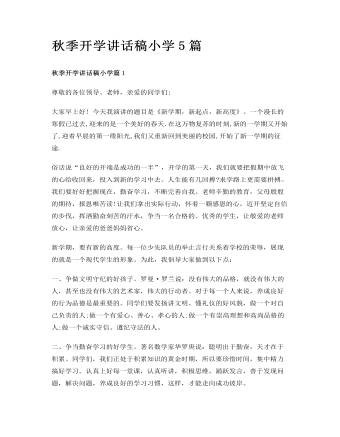
秋季开学讲话稿小学5篇
“民以食为天,食以安为先”,小小餐桌不仅传承了中华民族勤俭节约的优秀文化和传统美德,更承载着人民群众的身体健康和生命安全。为倡导“文明用餐,安全健康”的生活方式,引领“崇俭戒奢、文明守信”新风尚。为此,向全体师生发出倡议:一、倡导传统美德,弘扬文明新风。大力弘扬中华民族的传统美德,积极参与“文明餐桌”行动,“七不”劝导行动。“不乱扔垃圾、不随地吐痰、不乱贴乱画、不高空抛物、不大声喧哗、不扰乱公共秩序、不损害侵占公物”二、倡导勤俭惜福,反对铺张浪费。每位同学要崇尚绿色消费,理性消费,按需装饭,厉行节约,反对浪费,推行“光盘行动”,做到不剩饭、不剩菜。自觉遵守公共道德规范,爱护用餐环境,不在餐饮场所喧哗,注重餐饮礼仪,崇尚文明礼让。
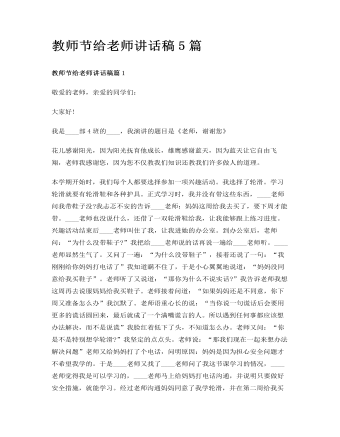
教师节给老师讲话稿5篇
亲爱的同学,我们能接受这样一群优秀的奋中师长的引领,我们享受其中的同时,更要倍加珍惜。然而,多少次,年少轻狂、任性冲动的我们,伤害了老师的感情或是无视老师的劳动成果。一次次,老师都以无比宽广的胸怀和爱包容了我们,同学们我们要用实真实在的行动来感谢和回报我们尊敬的老师,让我们努力成为让老师们欣慰和骄傲的学生,在我们的身上彰显出我们老师的风采,我想,这是献给我们老师最好的问候和祝愿。
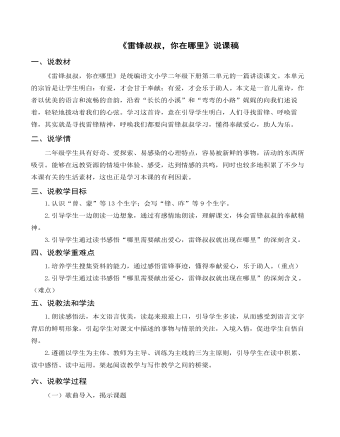
(说课稿)《雷锋叔叔,你在哪里》部编人教版二年级上册语文
三、说教学目标1.认识“曾、蒙”等13个生字;会写“锋、昨”等9个生字。2.引导学生一边朗读一边想象,通过有感情地朗读,理解课文,体会雷锋叔叔的奉献精神。3.引导学生通过读书感悟“哪里需要献出爱心,雷锋叔叔就出现在哪里”的深刻含义。四、说教学重难点 1.培养学生搜集资料的能力,通过感悟雷锋事迹,懂得奉献爱心,乐于助人。(重点)2.引导学生通过读书感悟“哪里需要献出爱心,雷锋叔叔就出现在哪里”的深刻含义。(难点)五、说教法和学法1.朗读感悟法,本文语言优美,读起来琅琅上口,引导学生多读,从而感受到语言文字背后的鲜明形象,引起学生对课文中描述的事物与情景的关注,入境入情,促进学生自悟自得。2.遵循以学生为主体、教师为主导、训练为主线的三为主原则,引导学生在读中积累、读中感悟、读中运用。架起阅读教学与写作教学之间的桥梁。
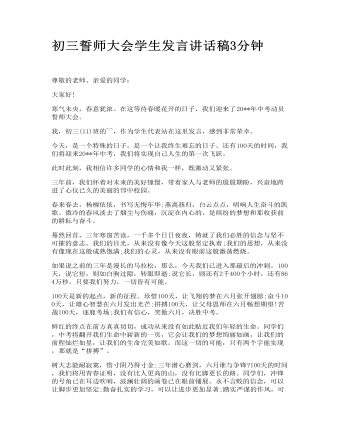
初三誓师大会学生发言讲话稿3分钟
三年前,我们怀着对未来的美好憧憬,带着家人与老师的殷殷期盼,兴奋地跨进了心仪已久的美丽的邗中校园。春来春去,杨柳依依,书写无悔年华;燕离燕归,白云点点,唱响人生奋斗的凯歌。微冷的春风淡去了烟尘与伤痛,沉淀在内心的,是缤纷的梦想和那收获前的耕耘与奋斗。蓦然回首,三年寒窗苦读,一千多个日日夜夜,铸就了我们必胜的信念与坚不可摧的意志。我们的目光,从来没有像今天这般坚定执着;我们的思想,从来没有像现在这般成熟饱满;我们的心灵,从来没有眼前这般激荡燃烧。
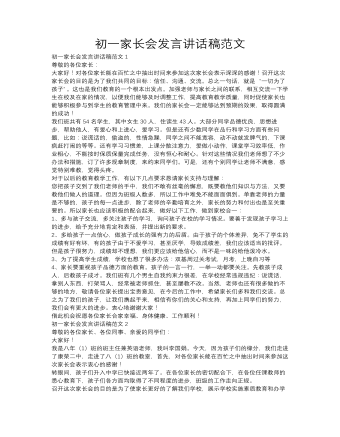
初一家长会发言讲话稿范文【5篇】
1、多与孩子交流,多关注孩子的学习,询问孩子在校的学习情况。要善于发现孩子学习上的进步,给予充分地肯定和表扬,并提出新的要求。2、多给孩子一点信心,做孩子成长的强有力的后盾。由于孩子的个体差异,免不了学生的成绩有好有坏,有的孩子由于不爱学习,甚至厌学,导致成绩差,我们应该适当的批评。但是孩子很努力,成绩却不理想,我们更应该给他信心,而不是一味的给他泼冷水。3、为了提高学生成绩,学校也想了很多办法:双基周过关考试,月考,上晚自习等4、家长要重视孩子品德方面的教育。孩子的一言一行,一举一动都要关注。先教孩子成人,后教孩子成才。我们班有几个男生自我约束力很差,在学校经常违规违纪:说谎话,拿别人东西,打架骂人,经常被老师抓住,甚至屡教不改。当然,老师也还有很多做的不够的地方,
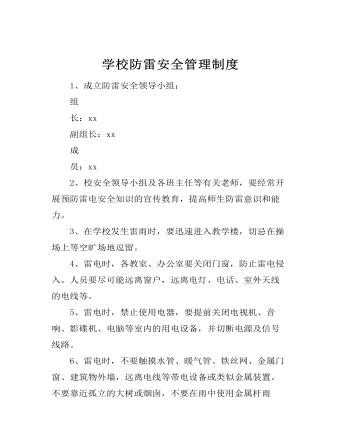
学校防雷安全管理制度
2、校安全领导小组及各班主任等有关老师,要经常开展预防雷电安全知识的宣传教育,提高师生防雷意识和能力。 3、在学校发生雷雨时,要迅速进入教学楼,切忌在操场上等空旷场地逗留。 4、雷电时,各教室、办公室要关闭门窗,防止雷电侵入。人员要尽可能远离窗户,远离电灯、电话、室外天线的电线等。 5、雷电时,禁止使用电器,要提前关闭电视机、音响、影碟机、电脑等室内的用电设备,并切断电源及信号线路。

新人教版高中英语必修3Unit 5 The Value of Money-Discovering Useful Structures导学案
4.They were going to find someone to take part in their bet when they saw Henry walking on the street outside.[归纳]1.过去将来时的基本构成和用法过去将来时由“would+动词原形”构成,主要表示从过去某一时间来看将要发生的动作(尤其用于宾语从句中),还可以表示过去的动作习惯或倾向。Jeff knew he would be tired the next day.He promised that he would not open the letter until 2 o'clock.She said that she wouldn't do that again.2.表示过去将来时的其他表达法(1)was/were going to+动词原形:该结构有两个主要用法,一是表示过去的打算,二是表示在过去看来有迹象表明将要发生某事。I thought it was going to rain.(2)was/were to+动词原形:主要表示过去按计划或安排要做的事情。She said she was to get married next month.(3)was/were about to+动词原形:表示在过去看来即将要发生的动作,由于本身已含有“即将”的意味,所以不再与表示具体的将来时间状语连用。I was about to go to bed when the phone rang.(4)was/were+现在分词:表示在过去看来即将发生的动作,通常可用于该结构中的动词是come,go,leave,arrive,begin,start,stop,close,open,die,join,borrow,buy等瞬间动词。Jack said he was leaving tomorrow.

新人教版高中英语必修3Unit 5 The Value of Money- Discovering Useful Structure教学设计
Step 3 Meaning1. 过去将来时表示从过去某一时间来看将要发生的动作或存在的状态, 常用在宾语从句中。一般由“would/should +动词原形”构成。She hoped that they would meet again someday. 她希望将来有一天他们能再见面。2. was/were going to+动词原形: 表示过去将要发生或很有可能发生的动作, 常用于口语中, 表示预言、意图或者打算等。He was going to start work the following week. 他打算下星期开始工作。3. was/were about to do: 常用来表示即将发生的动作, “刚要/正要做……”。注意该结构不与任何时间状语连用。I felt that something terrible was about to happen. 我感到某种可怕的事情即将发生。4.was/were to do: 表示“曾计划做某事”, 如果表示“本来计划做某事, 动作没实现”, 则需用 “was/were to have done”。She said she was to have told me about the accident. 她说她本来想告诉我关于事故的事。5.Start, go, come, leave, see, meet等动词的过去进行时: 表示就过去某一时刻而言即将发生的动作。She was coming later. 她随后就来。I had just put on my overcoat and was leaving to visit a friend of mine. 我刚穿上外套要去看我的一个朋友。

新人教版高中英语必修3Unit 5 The Value of Money-Listening &Speaking&Talking教学设计
4. A:We’d like to have someone to say a word at the beginning to welcome the group.B:↙Who?A:We thought that you or Dr.Johnson might do it.B用降调说Who,其意思是问,对方想让谁在开场时致欢迎词。Step 6 Pronunciation---Practice1. Listen to the short conversation and mark the intonation with ↗, ↙ or ↙, ↗. Then discuss with a partner what they intend to convey by using different intonation.Owner: You know what ?↗ It’s a million-pound bank note↙.Waiter 1: Really ?↗(question)Waiter 2: Really !↙(unbelievable and surprised)Waiter 3: Really ?!↙↗(first question then surprised)2. Listen to the conversations. Underline the parts that are stressed and mark the intonation. Then talk about the implied meanings of the responses with different intonations. Listen again and repeat.1) Henry: It’s a nice suit.Owner: Oh, it’s perfect!↙(The intonation means it is very suitable for Henry.)2) Henry: Well, that’s very kind of you.Owner: Kind, sir ?↗(what you said is not right) No, it’s kind of you. You must come whenever you want and have whatever you like. Just having you sit here is a great honour !!↙(welcome you to come again)3)Henry:Well, to be honest, I have none. Oliver:(happily) What luck!(excited) Brother↗, what luck!↙(It means “Didn’t you hear it?”)Henry: Well, it may seem lucky to you but not to me!↗(angry) If this is your idea of some kind of joke, I don’t think it’s very funny. Now if you’ll excuse me, I ought to be on my way.↙(If so, I would leave.)Roderick: Please don’t go↙...(hope Henry can wait for a moment)Part B Viewing and Talking---Describe people’s changing attitudes in a film clipStep 1 Before-listening---Tell the filmYou are going to watch part of the film The Million Pound Bank Note. Look at these photos and guess what happens in the film.

新人教版高中英语必修3Unit 5 The Value of Money-Listening &Speaking教学设计
Step 4: Listen again and decide if the following statements are true (T) or false (F).1 It was the first time Chen Liyan's story was reported. T口 F口2 Chen found 10,000 yuan in a small plastic bag in Taiyuan railway station口 F口3 Wang Zheng apologized to Chen because he couldn't offer her more money. T口 F口4 Chen took out a large loan to cure her daughter, T口 F口5 Wang set up a fundraising website for Chen's daughter after Chen told him about her situation. T口 F口Step 5:After listening, discuss the questions.1 What kind of person do you think Chen Liyan is?Chen Liyan is generous and honest because she returned a large sum of money to the owner.2 Did Chen return the money because she didn't need it?No. She returned the money because it was the right thing to do. Evidence for this is that she refused to accept the reward money because she felt that it had not been earned. 3 Is it common for people to do what Chen did?It depends on the culture. In some countries it is quite common to return money that has been found. In other countries, people believe "Finders are keepers!" 4 How did Wang Zheng feel about the return of his money?He must have been very happy and relieved to have gotten his money back. We know this because he thanked Chen repeatedly and even offered her a reward.5 Why did Ma Dongbao tell Wang about Chen's family?He must have had great sympathy for Chen and her daughter and wanted to help them.'We know this because he arranged help for them. 6 How did the news reporter feel about Chen's actions?The news reporter felt that it showed that money wasn't the most important thing in life. We know this because the reporter told us that this is what Chen believes. and then said, “that's a great attitude to take."

新人教版高中英语必修3Unit 5 The value of money-Reading and Thinking教学设计二
? Could you offer me some kind of work here?? I don’t want your charity, I just want an honest job.? Careless: I landed in Britain by accident.Step 7:Consolidation.? Find Henry? Roderick and Oliver were I .making a bet when they saw Henry, a poor young man. ? Know Henry? About a month ago, Henry was sailing and later he found himself carried out to sea by a strong wind. Fortunately, he 2.was spotted by a ship. And it was the ship that brought him to 3.England? Offer money to Henry ? Oliver and Roderick gave Henry a letter and told him that there was money in it. They 4.persuaded him to accept it, and made him 5.promise that it wouldn't be opened until 2 o'clock.Step 8:Language pointsa large amount of: a large quantity of; a great deal ofe.g. They bought a large amount of furniture before they moved their new house.make a bet: make an arrangement to risk money, etc. on an event of which the result is doubtful.e.g. We made a bet on the result of the match.permit sb to do something: allow somebody to do somethinge.g. My mother doesn’t permit me to ride in the street after it rained.by accident: as a result of chancee.g. I only found it by accident.stare at: look at somebody or something with the eyes wide open in a fixed gaze( in astonishment, wonder, fear, etc)to be honest: to tell you the truth; to be franke.g. To be honest, I don’t think we have a chance of winning.Step7 Homework:What do you think will happen to Henry? Will the bank-note help him or get him into trouble?

新人教版高中英语必修3Unit 5 The Value of Money-Reading and Thinking教学设计一
Everybody wants to get wealth.In today’s material world,making money or becoming wealthy symbolizes a person’s success and capability. Many people just make every effort, pay any price to attain greater wealth. With money,they can buy nice, large apartments in nice neighborhood. With money they can own luxurious cars. Wealth seems to bring all happiness in life.But is wealth the only road to happiness? Not really. There are many things in the world, which are beyond the means of money, such as friendship, love, health and knowledge. People are so preoccupied with struggling for money that they have no time or would not take the time to form or maintain friendship. What happiness can they feel living as lonely miserable creatures without love or friends in the world even if they accumulate tremendous wealth?In my opinion, people can’t do anything without money, but money is not everything. What money will bring you depends on your personal belief and goal in life. If you are kind enough to help others, especially the poor, money is a good thing to you. With it, you can do much more for the benefit of people and your country, and it will add to your own happiness. If you want money just for your own needs, you’ll never be satisfied or happy. In a word,you should have money spent for more people. Only then can money be the source of your happiness.Step 8 Homework4 students in a group, one acts Roderick, one Oliver, one servant and the fourth one acts Henry Adams, then listen to the tape, pay more attention to the difference between American English and British English in pronunciation, stress, tone.

新人教版高中英语必修3Unit 5 The Value of Money-Reading for Writing教学设计二
2. 您能看到, 我头发太长了。You can see that my hair is much too long.3. 无论什么时候, 只要您想回来就回来。Please come back whenever you want.4. 您仅有很少的头发要理! You only have too little hair to cut !5. 为您服务是我的荣幸!It is my honour to serve you!Step 9 Writing(Henry is walking down the street when he sees a sign for a place that cuts hair. He decides to have it cut. )H=Henry B=BarberH: Good afternoon, I’d like to have my hair cut, if I may. (The barber looks at Henry’s hair and continues cutting another man’s hair. ) Er, I’d really like a haircut. As you can see it’s much too long. B: (in a rude manner) Yes, I can see that. Indeed, I can. H: Fine, well, I’ll have a seat then. (He sits in one of the barber’s chairs. The barber turns to look at Henry. )B: It’s quite expensive here, you know! Are you sure you can afford it?H: Yes. I think so. (After his hair is cut, the barber tells Henry how much he must pay. Henry shows the barber the bank note. )B: Why Mr. . . (looks shocked)H: Adams. Henry Adams. I’m sorry. I don’t have any change. B: Please don’t worry! (wearing a big smile) Nothing to worry about! Nothing at all! Please come back whenever you want, even if you only have too little hair to cut! It will be my honour to serve you!Step 10 Pair workExchange drafts with a partner. Use this checklist to help your partner revise his/her draft.1. Are all the elements of a play included and in good order ?2. Do the character use suitable language ?3. Are the stage directions clear and useful ?4. Is the plot clear and exciting enough ?
